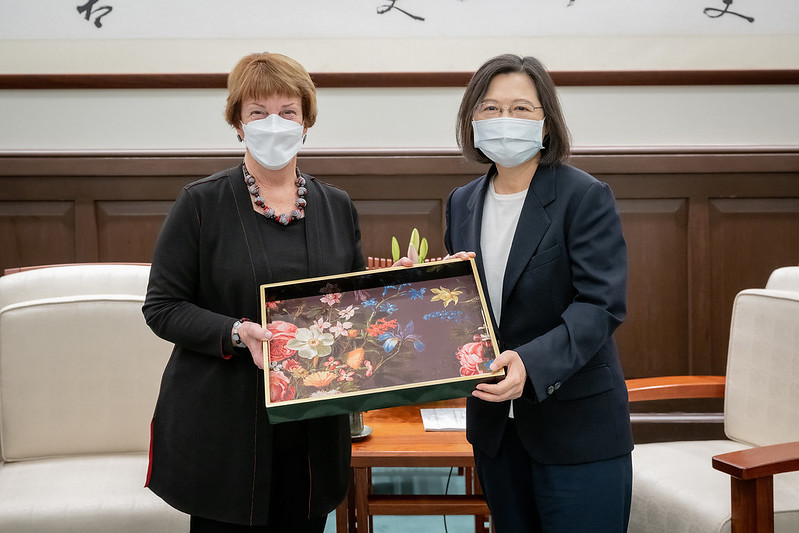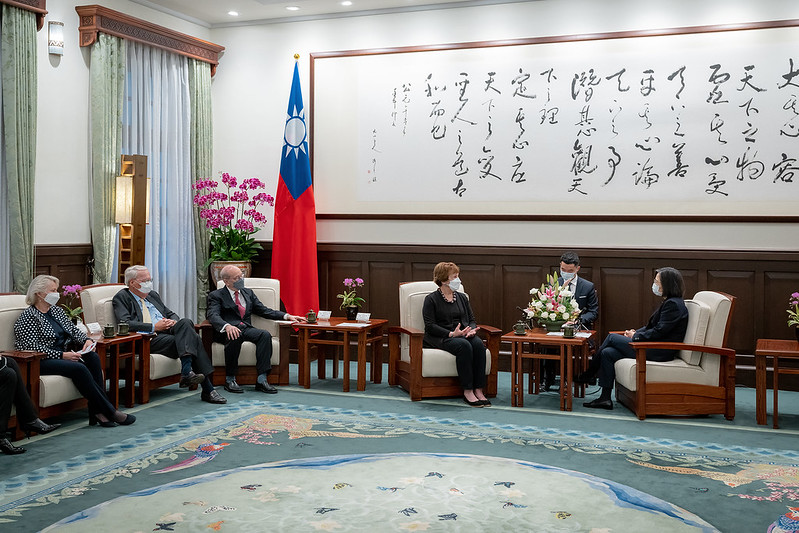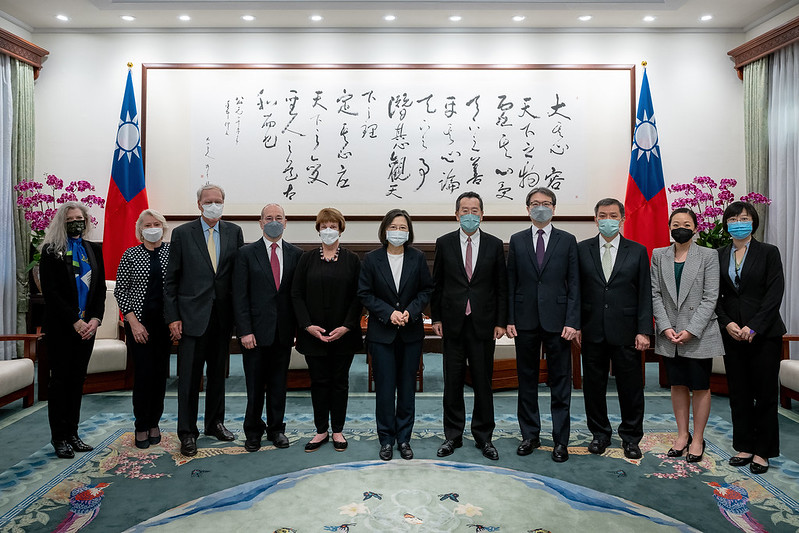News & activities
 News releases
News releases
On the morning of December 5, President Tsai Ing-wen met with a delegation from the National Committee on American Foreign Policy (NCAFP). In remarks, President Tsai said that Taiwan and the United States are important strategic and economic partners, and that our close bilateral ties are a cornerstone of a free, stable, and prosperous Indo-Pacific region. She stated that Taiwan will continue to safeguard regional peace and stability and further bolster cooperation with the US and other democratic partners to jointly defend democratic values and counter authoritarian expansionism. The president also said that Taiwan hopes to forge more secure and resilient supply chains underpinned by democratic values to help us make greater contributions to the world.
A translation of President Tsai's remarks follows:
I want to extend a warm welcome to Ambassador Susan Elliott, President and CEO of the NCAFP, who is once again leading a delegation to Taiwan and paying a visit to the Presidential Office. Taiwan greatly values the NCAFP, which is an important think tank and platform for exchange. All of our guests today have long been good friends of Taiwan.
Today, I am delighted to once again meet with Daniel Russel, former US Assistant Secretary of State for East Asian and Pacific Affairs, Ambassador Raymond Burghardt, and Susan Thornton, NCAFP Project Director, and to welcome Allison Hooker, Senior Vice President of American Global Strategies, and Juliet Lee, NCAFP Deputy Director. I would like to take this opportunity to thank you all for your longstanding attention to the security situation across the Taiwan Strait. You all play an important role in the continued deepening of Taiwan-US ties.
Since Ambassador Elliott last led a delegation to Taiwan in 2019, the Taiwan-US partnership has grown ever closer. We have supported each other in addressing the challenges of the COVID-19 pandemic and promoting the Global Cooperation and Training Framework (GCTF).
The GCTF has grown to include partner countries from Europe, Latin America, and the Caribbean. And just last month, the GCTF held an international workshop in Israel – the first to be held in the Middle East.
This November in New York, Taiwan and the US held the first in-person meetings for the Taiwan-US Initiative on 21st-Century Trade. I am sure you have all taken note of the continued progress being made in Taiwan-US relations.
In recent years, Taiwan and the US have also strengthened national defense exchanges and cooperation. We are grateful to the Biden administration for approving six military sales to Taiwan since assuming office. After US House Speaker Nancy Pelosi visited Taiwan this August, China began conducting military exercises in the areas around Taiwan, unilaterally disrupting peace and stability across the Taiwan Strait and the region. This September, the US government announced another military sale to Taiwan, demonstrating the great importance the US places on Taiwan's national security needs and its commitment to Taiwan's security.
Taiwan and the US are important strategic, economic, and trade partners. Our close bilateral ties are a cornerstone of a free, stable, and prosperous Indo-Pacific region.
A few days ago, President Joe Biden of the US and President Emmanuel Macron of France held a meeting before issuing a joint statement reiterating the importance of maintaining peace and stability across the Taiwan Strait. Moving forward, Taiwan will continue to safeguard regional peace and stability and further bolster our cooperation with the US and other democratic partners around the world to jointly defend democratic values and counter authoritarian expansionism.
Facing the challenges of a post-pandemic world, Taiwan hopes to work with the international community to forge more secure and resilient supply chains underpinned by democratic values to help us make greater contributions to the world.
In closing, I once again welcome you all to Taiwan and wish you a pleasant and productive stay.
Ambassador Susan Elliott then delivered remarks and thanked President Tsai for her warm welcome. The ambassador noted that this is the first NCAFP visit to Taiwan since 2019 and said that it was a privilege to meet with President Tsai. She also mentioned that the NCAFP has a long history of cooperation with experts and scholars in Taiwan, and added that her delegation is honored to be back in Taiwan three years after the last NCAFP visit.
Ambassador Elliott stated that despite the COVID-19 pandemic, the NCAFP has been very active online over the past three years, engaging with colleagues in Taiwan, China, and the US, and interacting with others in Korea and Japan while looking at peace and stability in the region.
The ambassador expressed agreement with President Tsai that dialogue is the best way to maintain peace, stability, and prosperity in the region, and said that the members of the NCAFP delegation are fortunate to engage with President Tsai and their colleagues in Taiwan.
Mentioning that this is her third visit to Taiwan since becoming the president of the NCAFP, Ambassador Elliott said that the NCAFP has a longstanding commitment to its friendship with Taiwan. She noted that the delegation's meeting with President Tsai was their first of the day, after which they will have a wide variety of meetings in Taipei.
Ambassador Elliott also thanked the Ministry of Foreign Affairs for helping to plan their trip and offering support to their delegation. She then thanked President Tsai for her leadership and friendship to the American people, before echoing the president's statement that Taiwan and the US have a strong relationship that we all hope will continue.
Also present at the meeting were Vice President for International Security and Diplomacy at the Asia Society Policy Institute Daniel Russel, President of the Pacific Century Institute Raymond Burghardt, Project Director of the NCAFP Forum on Asia-Pacific Security Susan Thornton, Senior Vice President of American Global Strategies Allison Hooker, and Deputy Project Director of the NCAFP Forum on Asia-Pacific Security Juliet Lee.












